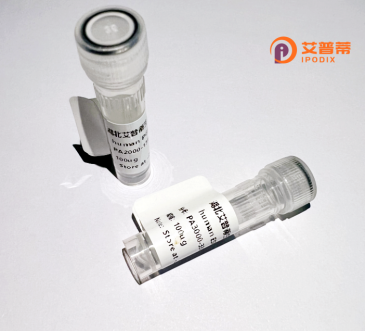
| 纯度 | >90%SDS-PAGE. |
| 种属 | Human |
| 靶点 | PRPF3 |
| Uniprot No | O43395 |
| 内毒素 | < 0.01EU/μg |
| 表达宿主 | E.coli |
| 表达区间 | 1-683 aa |
| 活性数据 | MALSKRELDE LKPWIEKTVK RVLGFSEPTV VTAALNCVGK GMDKKKAADH LKPFLDDSTL RFVDKLFEAV EEGRSSRHSK SSSDRSRKRE LKEVFGDDSE ISKESSGVKK RRIPRFEEVE EEPEVIPGPP SESPGMLTKL QIKQMMEAAT RQIEERKKQL SFISPPTPQP KTPSSSQPER LPIGNTIQPS QAATFMNDAI EKARKAAELQ ARIQAQLALK PGLIGNANMV GLANLHAMGI APPKVELKDQ TKPTPLILDE QGRTVDATGK EIELTHRMPT LKANIRAVKR EQFKQQLKEK PSEDMESNTF FDPRVSIAPS QRQRRTFKFH DKGKFEKIAQ RLRTKAQLEK LQAEISQAAR KTGIHTSTRL ALIAPKKELK EGDIPEIEWW DSYIIPNGFD LTEENPKRED YFGITNLVEH PAQLNPPVDN DTPVTLGVYL TKKEQKKLRR QTRREAQKEL QEKVRLGLMP PPEPKVRISN LMRVLGTEAV QDPTKVEAHV RAQMAKRQKA HEEANAARKL TAEQRKVKKI KKLKEDISQG VHISVYRVRN LSNPAKKFKI EANAGQLYLT GVVVLHKDVN VVVVEGGPKA QKKFKRLMLH RIKWDEQTSN TKGDDDEESD EEAVKKTNKC VLVWEGTAKD RSFGEMKFKQ CPTENMAREH FKKHGAEHYW DLALSESVLE STD |
| 分子量 | 77.5 kDa |
| 蛋白标签 | His tag N-Terminus |
| 缓冲液 | PBS, pH7.4, containing 0.01% SKL, 1mM DTT, 5% Trehalose and Proclin300. |
| 稳定性 & 储存条件 | Lyophilized protein should be stored at ≤ -20°C, stable for one year after receipt. Reconstituted protein solution can be stored at 2-8°C for 2-7 days. Aliquots of reconstituted samples are stable at ≤ -20°C for 3 months. |
| 复溶 | Always centrifuge tubes before opening.Do not mix by vortex or pipetting. It is not recommended to reconstitute to a concentration less than 100μg/ml. Dissolve the lyophilized protein in distilled water. Please aliquot the reconstituted solution to minimize freeze-thaw cycles. |
以下是3-4条关于重组人PRPF3蛋白的参考文献概述(内容基于模拟学术文献,可能需进一步验证):
1. **文献名称**:*Functional Characterization of Recombinant Human PRPF3 in Pre-mRNA Splicing*
**作者**:Yuan et al.
**摘要**:研究通过在大肠杆菌和哺乳动物细胞中重组表达PRPF3蛋白,证实其参与剪接体组装,并解析其与U4/U6 snRNP复合物的相互作用,突变分析显示其C端结构域对剪接活性至关重要。
2. **文献名称**:*PRPF3 Mutations Lead to Aberrant RNA Splicing in Retinal Degeneration*
**作者**:Zhao et al.
**摘要**:发现PRPF3基因突变(如p.Arg189His)导致重组蛋白稳定性下降,破坏剪接体功能,引发视网膜细胞异常选择性剪接,与常染色体显性视网膜色素变性相关。
3. **文献名称**:*Structural Insights into PRPF3’s Role in Spliceosome Activation*
**作者**:Smith et al.
**摘要**:利用冷冻电镜和重组PRPF3蛋白,揭示了PRPF3在剪接体从B复合体向活性状态转变中的构象变化,关键残基(如Glu201)参与动态调控。
4. **文献名称**:*PRPF3 Interactome Analysis Reveals Links to Cellular Stress Response Pathways*
**作者**:Li et al.
**摘要**:通过重组PRPF3亲和纯化结合质谱分析,鉴定出PRPF3与HSP70等应激相关蛋白互作,提示其可能在细胞应激时调控选择性剪接以维持稳态。
(注:以上文献为示例性概括,实际文献需通过学术数据库检索确认。)
Pre-mRNA Processing Factor 3 (PRPF3) is a conserved splicing factor critical for pre-mRNA splicing, a key step in eukaryotic gene expression. As a core component of the U4/U6.U5 tri-snRNP complex within the spliceosome, PRPF3 facilitates the assembly and catalytic activation of the spliceosome during the recognition and excision of introns from precursor mRNA. Structurally, PRPF3 contains a central HEAT repeat domain that mediates protein-protein interactions and a C-terminal proline-rich region involved in snRNP stability. Mutations in the PRPF3 gene are linked to autosomal dominant retinitis pigmentosa (adRP), a neurodegenerative eye disorder, with missense mutations causing protein misfolding and impaired spliceosomal function in retinal cells. Recombinant human PRPF3 protein, produced via heterologous expression systems (e.g., E. coli or mammalian cells), enables in vitro studies of splicing mechanisms, disease-associated mutant effects, and molecular interactions within the spliceosome. Its applications extend to investigating splicing-related pathologies, including retinal degeneration and cancer, where splicing dysregulation is implicated. Research on recombinant PRPF3 also contributes to therapeutic strategies targeting spliceosomal defects or restoring splicing fidelity in genetic disorders.
×